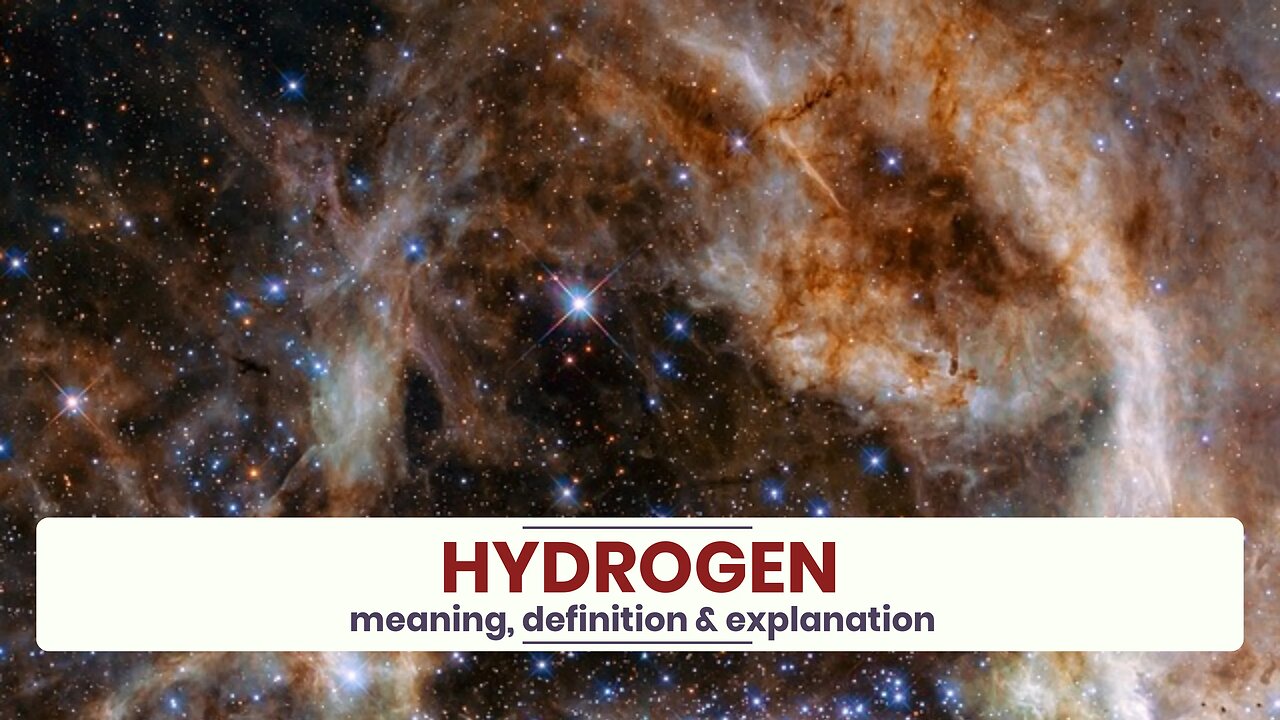Premium Only Content

What is HYDROGEN?
✪✪✪✪✪
http://www.theaudiopedia.com
✪✪✪✪✪
What does HYDROGEN mean? HYDROGEN meaning - HYDROGEN definition - HYDROGEN explanation. What is the meaning of HYDROGEN? What is the definition of HYDROGEN? What does HYDROGEN stand for? What is HYDROGEN meaning? What is HYDROGEN definition?
Hydrogen is a chemical element with chemical symbol H and atomic number 1. With an atomic weight of 1.00794 u, hydrogen is the lightest element on the periodic table. Its monatomic form (H) is the most abundant chemical substance in the Universe, constituting roughly 75% of all baryonic mass. Non-remnant stars are mainly composed of hydrogen in the plasma state. The most common isotope of hydrogen, termed protium (name rarely used, symbol 1H), has one proton and no neutrons.
The universal emergence of atomic hydrogen first occurred during the recombination epoch. At standard temperature and pressure, hydrogen is a colorless, odorless, tasteless, non-toxic, nonmetallic, highly combustible diatomic gas with the molecular formula H2. Since hydrogen readily forms covalent compounds with most non-metallic elements, most of the hydrogen on Earth exists in molecular forms such as water or organic compounds. Hydrogen plays a particularly important role in acid–base reactions because most acid-base reactions involve the exchange of protons between soluble molecules. In ionic compounds, hydrogen can take the form of a negative charge (i.e., anion) when it is known as a hydride, or as a positively charged (i.e., cation) species denoted by the symbol H+. The hydrogen cation is written as though composed of a bare proton, but in reality, hydrogen cations in ionic compounds are always more complex. As the only neutral atom for which the Schrödinger equation can be solved analytically, study of the energetics and bonding of the hydrogen atom has played a key role in the development of quantum mechanics.
Hydrogen gas was first artificially produced in the early 16th century by the reaction of acids on metals. In 1766–81, Henry Cavendish was the first to recognize that hydrogen gas was a discrete substance, and that it produces water when burned, the property for which it was later named: in Greek, hydrogen means "water-former".
Industrial production is mainly from steam reforming natural gas, and less often from more energy-intensive methods such as the electrolysis of water. Most hydrogen is used near the site of its production site, the two largest uses being fossil fuel processing (e.g., hydrocracking) and ammonia production, mostly for the fertilizer market. Hydrogen is a concern in metallurgy as it can embrittle many metals, complicating the design of pipelines and storage tanks.
-
 1:52
1:52
The Audiopedia
1 year agoWhat is EXECUTIVE DIRECTOR?
551 -
 LIVE
LIVE
Badlands Media
8 hours agoDevolution Power Hour Ep. 383
7,185 watching -
 LIVE
LIVE
TimcastIRL
3 hours agoTrans Shooter Targets Catholic Kids In Mass Shooting, Leftists Reject Prayers | Timcast IRL
6,316 watching -
 LIVE
LIVE
SpartakusLIVE
4 hours ago#1 Birthday Boy Celebrates with MASSIVE and HUGE 4.8-Hour Stream
360 watching -
 LIVE
LIVE
Man in America
6 hours agoFrom Oil Barons to Pill Pushers: The Rockefeller War on Health w/ Jeff Adam
616 watching -

Barry Cunningham
3 hours agoBREAKING NEWS: PRESIDENT TRUMP THIS INSANITY MUST END NOW!
53.7K99 -
 LIVE
LIVE
StevieTLIVE
2 hours agoWednesday Warzone Solo HYPE #1 Mullet on Rumble
112 watching -
 5:58
5:58
Mrgunsngear
3 hours ago $0.78 earnedBreaking: The New Republican Party Chairman Is Anti 2nd Amendment
4.46K5 -
 LIVE
LIVE
Geeks + Gamers
3 hours agoGeeks+Gamers Play- MARIO KART WORLD
225 watching -
![(8/27/2025) | SG Sits Down Again w/ Sam Anthony of [Your]News: Progress Reports on Securing "We The People" Citizen Journalism](https://1a-1791.com/video/fww1/d1/s8/6/G/L/3/c/GL3cz.0kob.1.jpg) 29:34
29:34
QNewsPatriot
3 hours ago(8/27/2025) | SG Sits Down Again w/ Sam Anthony of [Your]News: Progress Reports on Securing "We The People" Citizen Journalism
6.93K1